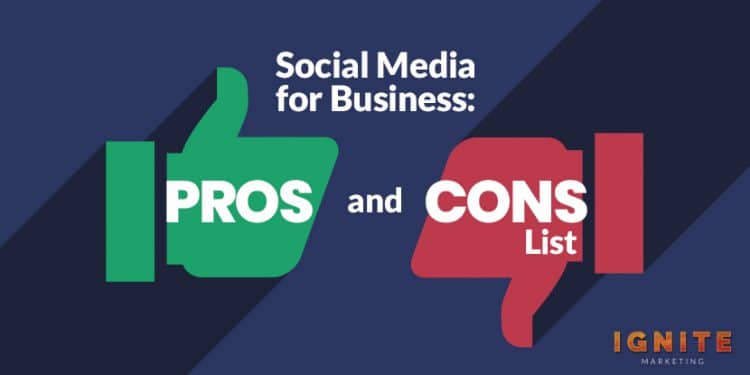


Should you use social media for your business?
It’s a tough decision.
There are a lot of pros ‒ like having access to over 4.2 billion social media users and ads that cost pennies per engagement.
But there are also quite a few cons, such as additional time investment and an increased risk of negative publicity.
It’s up to you to decide whether to use this new medium to engage with your target market. To help you make an informed decision, I’ve compiled this comprehensive list of pros and cons for using social media in your business

The ultimate goal of any marketing strategy is always the same ‒ to increase sales of a product or service.
If done effectively, social media marketing will result in a substantial sales increase.
It’s common sense ‒ the vast majority of your target market is on social media. If you can connect and persuasively engage with these people, you’re virtually guaranteed to turn some into long-standing customers.
It should be noted that new customer acquisition isn’t the only goal social media is useful for. It’s also an excellent customer retention tool.
Staying engaged with people who have already bought a product or service from you is integral to the continued success of your business. According to Forbes, 20% of your customers represent 80% of your sales. By using social media to engage with this small but loyal (and purchase-happy) customer base, you can substantially increase the revenue your existing customer base brings in.
Lead generation isn’t what it used to be. Gone are the days of magazine forms and mailing out surveys. Nowadays, it’s all about finding your target market online and getting them into your sales funnel.
And where is everyone hanging out? You guessed it ‒ social media.
This isn’t based on guesswork either. It’s based on raw, reliable data.
I’m not going to lie ‒ lead generation is tricky. 65% of businesses say generating leads is the biggest challenge they face in marketing.
Because of this, you need to take advantage of every lead generation opportunity you can ‒ and that includes using social media.
Marketing usually costs money. If you want to run a commercial on TV or put up a billboard on a local highway, it’s going to cost a substantial chunk of upfront money.
This isn’t the case with social media. Creating accounts and connecting with your target market is 100% free. The only cost is your time and effort.
Sure, it costs money to use the paid advertising options social platforms offer. However, the costs and risks associated with these types of ads are much less than in traditional advertising.
Because most platforms charge for engagement or per thousand views, you can figure out whether a new marketing strategy works for $5 or less. This is significantly more cost-effective than paying thousands for a TV spot and crossing your fingers.
More than 4.2 billion people are using social media. That’s more than half of the world’s population ‒ and this percentage increases substantially in modernized nations like the United States.
By using social media for your business, you gain direct access to this unfathomably large group of people. And while you won’t engage with everyone, the microtargeting capabilities embedded in social platforms to connect with your target audience instantly.
One of the most effective ways to attract visitors to your website is by writing blog content. (Have you seen how much content we produce on this blog? It works!)
This content will show up in Google search results for specific keywords and bring in free, organic, highly interested traffic.
Note: Google gets 88.6% of all search engine traffic ‒ so it’s the only search engine you need to care about.
To rank high in the Google search results and bring in this lucrative organic traffic, you need to boost your SEO. And using social media is a great way to improve your search engine rankings.
Here’s how:
Social media brings backlinks
Nobody outside of Google knows exactly how much backlinks matter in SEO. However, we do know that they matter.
While social sharing backlinks play a small role in SEO, the increased visibility in your industry can get you valuable backlinks from other websites.
Social media brings traffic.
Google measures all sorts of metrics about your website to determine its rank in the search results. Here are some of the most critical:
By attracting interested readers from social media, you can boost all of these metrics ‒ which will help you rank higher in the search results.
We talked about how social media can have a positive effect on your website’s SEO. That’s not the only way it can improve your business’s competitiveness in the search results, though.
When searchers type in your business, your social media profiles are usually some of the first results that pop up. This ensures that pages you control show up first when people search for your business on Google.
Social media is one of the most under-utilized forms of marketing in the small business world.
According to Vendasta, 41% of local businesses depend on social media to drive revenue -- which means that 59% of local businesses aren’t using social media to bring in revenue.
If you have a local business in a particularly competitive area, using social media can give you the edge you need to beat out your competitors.
According to Investopedia, brand loyalty is “a pattern of consumer behavior where consumers become committed to brands and make repeat purchases over time.”
While convincing consumers to make a repeat purchase is important, it’s not the only reason brand loyalty is vital for your business.
Using social media is a terrific way to nurture a community of loyal advocates. It’s one of the only communication mediums where your brand can come across as a friend rather than as a company seeking to generate an ROI. You can use this perception to your advantage by genuinely engaging with your social followers.
“The customer is always right” is an adage that is often wrong nowadays ‒ but it still holds in several circumstances.
One of these circumstances is in providing feedback on your products or services. If a customer has a negative view of how you’re running your business, you should want to know about it as soon as possible.
Social media gives customers instant, frictionless access to you. By sending you a message, customers can tell you what they think about your products or services ‒ making it easier to catch a fire before it becomes an inferno.
Offering a direct-access hotline in the form of social media messaging is useful ‒ but this hotline goes both ways.
If you need to tell your customers about some urgent news or a limited-time promotion, you’ll want to do so quickly.
Blasting the message out on social media is the fastest way to reach a large number of people. And it’s easy too ‒ a quick post on Facebook, Twitter, Instagram, and any other platforms you’re on will get the message to the majority of your audience lickety-split.

The more you know about your target market, the better.
Social media offers a unique opportunity to peer inside the lives of your audience. By viewing the profiles and posting habits of your most active followers, you’ll glean all sorts of useful information that you can’t find elsewhere:
These insights can be used to improve your existing products or services, come up with new ones, or implement a new marketing strategy.

Running your own business already takes up a ton of time. Learning the ins and outs of social media marketing can add a heavy demand on your already limited attention span. And this time drain only compounds as you add on all of the extra responsibilities social media marketing brings:
Fortunately, the entire social media marketing production can be outsourced. Hiring a marketing firm with social expertise can save you from a headache-inducing learning curve and start your marketing efforts off on the right foot.
Social media marketing can take a while to figure out.
While more traditional forms of marketing (television commercials, print advertising, etc.) can be effective following traditional copywriting tenets, social media is different. To engage your audience on platforms like Facebook and Instagram, you need to join in the conversation ‒ not force your products on people with overly salesy tactics.
This change in approach can take a while to get used to, especially if you’re used to the more direct style that is effective in other communication mediums. And because this transition takes time, you might see a delay in generating an acceptable ROI.
*It should be mentioned that traditional Social Media Marketing (build an audience, post images/text and engage with readers) isn’t the same as Paid Social Media Marketing, which the latter can produce ROI quite fast. Contact us if you’d like to talk more about the differences between them. [link to appt link]

Posting the right stuff on social media can be tricky. If you don’t draw a well thought out line between professional and personal, you can end up posting something that offends some of your followers.
Here are a few tips for avoiding unwanted negative publicity when posting on social media:
No matter how hard you try, some customers are going to be unhappy with your business. Before the digital age, this dissatisfaction would find its way to you in the form of a private phone call, or perhaps in a strongly worded letter.
Things are different now. If a customer is unhappy with you, there’s a good chance they post about it on social media. If they make an angry post, their entire network will instantly know about it.
If their dissatisfaction is particularly justified, their angry rant might go viral. This can be particularly damaging if you’re a small local business, as many of the people in your unhappy customer’s network are likely part of your target market. And if those people start sharing that one person’s negative review, the whole town could soon be talking about it.
People view brands on social media as a singular entity. Even though these brands often have many people working for them, followers expect the brand to have a consistent voice that persists in every post and interaction.
So if you have multiple people using your business’s social accounts, their difference in styles can dilute your brand’s voice.
If your business is small enough, you can eliminate this problem by having one person handle your social media marketing. But if you have multiple people working on your social accounts, you must come up with a style guide that dictates how your brand should sound.
Not all engagement is useful.
If you run a paid ad on Facebook, getting a bunch of likes on that ad can seem exciting and meaningful. But likes don’t bring in revenue; conversions do. So if the ad doesn’t result in any clicks to your website, those likes weren’t useful.
In fact, they can be detrimental ‒ depending on how you set up your ad, Facebook might be charging you for each instance of engagement the ad brings. Paying for engagement that doesn’t increase revenue is a waste of money ‒ so make sure you fine-tune your ad strategy to only pay for engagement that matters.
On top of this, not every user who engages with a sponsored post is a potential customer. They might think your ad is funny or intriguing and give it a like or comment, but many of them will have zero need for your product or service.
This is another way that engagement can be misleading. A post that gets a lot of likes might seem successful ‒ but real success is measured in dollars, not likes.
